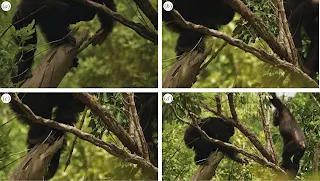Now a group of savannah chimpanzees (Pan troglodytes verus) has been observed not only using spears to hunt with, but selecting suitable tree branches and sharpening a point on them. Like humans, chimpanzees are partially meat-eaters and will catch other primates such as monkeys and, in this case, bushbabies (galagos), often working in organized hunting parties, but this is the first time they have been observed using spears to injure or kill their prey.
Abstract
For anthropologists, meat eating by primates like chimpanzees (Pan troglodytes) warrants examination given the emphasis on hunting in human evolutionary history. As referential models, apes provide insight into the evolution of hominin hunting, given their phylogenetic relatedness and challenges reconstructing extinct hominin behaviour from palaeoanthropological evidence. Among chimpanzees, adult males are usually the main hunters, capturing vertebrate prey by hand. Savannah chimpanzees (P. t. verus) at Fongoli, Sénégal are the only known non-human population that systematically hunts vertebrate prey with tools, making them an important source for hypotheses of early hominin behaviour based on analogy. Here, we test the hypothesis that sex and age patterns in tool-assisted hunting (n=308 cases) at Fongoli occur and differ from chimpanzees elsewhere, and we compare tool-assisted hunting to the overall hunting pattern. Males accounted for 70% of all captures but hunted with tools less than expected based on their representation on hunting days. Females accounted for most tool-assisted hunting. We propose that social tolerance at Fongoli, along with the tool-assisted hunting method, permits individuals other than adult males to capture and retain control of prey, which is uncommon for chimpanzees. We assert that tool-assisted hunting could have similarly been important for early hominins.
This an illustration of the cognitive abilities of these chimpanzees who not only need to understand that a pointed stick is more effective than a blunt one, but also that stabbing another animal either kills it or makes it easier to catch and kill by hand. They clearly have a good understanding of the world around them and sufficient ability to plan to know what branches to select and then sharpen them for a purpose. This can only be possible with a high degree of self-awareness and the ability to conceptually project themselves into the future. In other words, these animals are sentient.
It's interesting too that females are significantly more likely to make and use spears. The authors propose that this not only gives them the ability to catch prey - normally the preserve of the males - but also to retain control of it once caught.
From an evolutionary point of view, this illustrates the role of social ideas, or memes, in a culture. It is highly unlikely that these chimpanzees have evolved a genetic basis for making spears; rather, like other chimpanzees and humans and very probably other social animals, they have evolved the ability to learn from their peers and parents, so, once discovered, or intelligently designed by a particularly intelligent chimpanzee, spear-making and hunting skills can be learned. Here we have an example of gene-meme co-evolution and the evolution of a possibly unique culture in this group of chimpanzees.
We also have an illustration of how hunting weapons could have developed in our ancestors because, being present in both us and chimpanzees, this ability to learn would almost certainly have been present in our last common ancestor. Once adopted by hominids, this skill could have been a significant step on the road to us developing the ability hunt and eventually to chase and to throw a spear and so catch larger prey on the grasslands of East Africa from a safe distance - and maybe to defend ourselves against predators. And of course, to fight other hominid groups for control of territory, or simply because they had the 'wrong' culture.
The ability to kill at a distance would have given the group a huge advantage over those who lacked this technology, so the surviving group would be the one from which we are descended, inheriting the ability to learn, to plan and to hunt together as a cooperative group, because we had the genes to learn and inherit these memes. So these genes and memes naturally, and with no intelligent plan, formed a cooperative alliance, just like any other group of replicators will when cooperation leads to more copies of themselves than non-cooperation or active competition does
Natural selection has ensured that we, like all other living organisms, are the descendants of the ones who succeeded and never ever failed to breed.
Reference:
New evidence on the tool-assisted hunting exhibited by chimpanzees (Pan troglodytes verus) in a savannah habitat at Fongoli, Sénégal | Open Science
'via Blog this'

Didn't an auspicious person at the tail end of the nineteenth century state that there was nothing left to invent or discover? Can't remember who it was. Love your work, too. Thanks.
ReplyDeleteThank you.
Delete